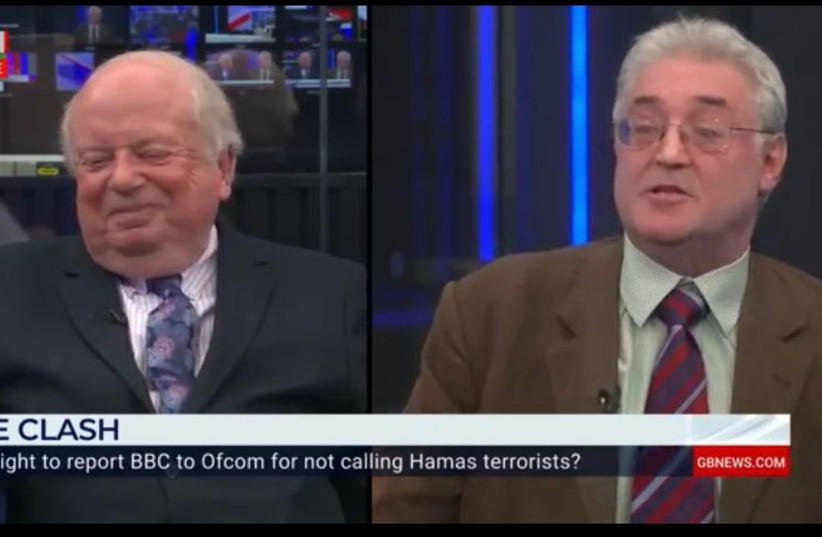https://www.jpost.com/diaspora/antisemitism/article-768290
In an interview with GB News, former BBC Chief Political Correspondent John Sergeant defended the BBC’s decision to not label Hamas a terrorist organization and smirked at calls to do so.
The interview was carried out in light of growing complaints that the BBC is not providing fair and unbiased reporting on the Israel-Hamas conflict.
Sergeant was interviewed in a debate with the National Jewish Assembly Chairman Gary Mond.
Sergeant said, "Of course people have found it difficult to follow this, lots of people do…They think ‘it’s obvious, the US government calls them terrorists, we have heard all these other people call them terrorists…’ They don’t seem to understand that the BBC operation, news operation, is not like a government. It is not meant to be like a government, it is not meant to have a policy on the Middle East…
"I don’t know why people can’t follow this but if you are deeply involved in the struggle and you feel passionately about it, you can’t understand; to you it is common sense. Here are these people who are acting outrageously, they must be terrorists.”
Advertisement

 Former BBC correspondent in interview with GB News about not labelling Hamas as terrorists. (credit: screenshot)
Former BBC correspondent in interview with GB News about not labelling Hamas as terrorists. (credit: screenshot)
The host then interrupted with the question “Do you not think it’s because they slit a baby’s throats?”
Sergeant responded “Oh sure it is not, that is an atrocity.”
The host again prompted: “Is that not a terrorist act?”
Sergeant went on to explain “No, that is a different matter. You are trying to… If you ask me what do I think about that, right? A straight forward question. I left the BBC more than 20 years ago, What do I think about Hamas? Terrorism, right? This is a terrorist act, that’s quite straight forward. Ask me if I am back in the BBC as a BBC correspondent, what the BBC should do: that is of course completely different.
“The BBC does not have an agenda. The BBC is not trying to decide who has done well or badly in the Middle East and then tell people what they should think. "
The host interjected by saying: “The problem is, to some people…like they do have an agenda and that agenda is to support Hamas and Palestine."
Mond then accused Sergeant of using “weasel words”, which means words that are intentionally ambiguous.
Mond countered that the UK government, the King of England and a number of other officials had all recognized Hamas as terrorist organization.
 Collegiate-inspired pieces from new UNIQLO x JW Anderson collectionSponsored by UNIQLO
Collegiate-inspired pieces from new UNIQLO x JW Anderson collectionSponsored by UNIQLO
 Nurture your health and financial well-being with AIASponsored by AIA Singapore
Nurture your health and financial well-being with AIASponsored by AIA Singapore
“Their mission is to murder every Jew in the world,” Mond said in a visibly emotional statement. “Okay, they may not succeed in that but they have made a jolly good start by killing more than 1,000 people in Israel.
“It is completely unacceptable to do anything other than condemn them. This is a struggle where it is just not possible to be neutral.
“In many, many conflicts and wars over the last 50 years, a lot of people have been neutral. This is one where on the one side, you’ve got a group whose objective is literally to kill people in large numbers and to carry on killing them in so far as they are able to do. And on the other side, you have innocent people who are trying to get on with their lives.”
The host then asks Sergeant why the BBC has made the decision to designate other groups as terrorist but not Hamas.
“Of course if you are involved,” Sergeant repeated in response “you don’t expect, and I certainly don’t expect people…there are Jewish friends of mine that are complaining bitterly about this…I quite understand that. I spent 30 years in the BBC and was never told what to say but I certainly knew what the rules were – and they go right back to the Second World War.
“What did the BBC staff say about the Nazis? Were they allowed to call them “wicked” or “evil”? No, they were not. They were told not to rant…They called them the enemy.”
Anjana Gadgil, the news presenter, made these comments while discussing Israel's military operation in Jenin with former-Israeli Prime Minister Naftali Bennet.
The BBC, only six days ago, also hosted a guest who celebrated Hamas’ attacks against civilians as “legitimate and moral,” while comparing the invasion to the Warsaw Ghetto Uprising.
In December of 2022, the UK government ordered a probe into the BBC’s reporting on Israel, claiming that the BBC had made multiple mistakes in reporting of antisemitic incidents. This is something the BBC has also acknowledged in the form of an apology.
Related TagsIsraelHamasTerrorismmediaBBCantisemitism
STAY INFORMED
As the war against Hamas unfolds, our unwavering newsroom remains committed to covering Israel's most profound crisis.
Sign up for our newsletter to get real-time news and in-depth analysis from our top reporters.
Subscribe Now
In an interview with GB News, former BBC Chief Political Correspondent John Sergeant defended the BBC’s decision to not label Hamas a terrorist organization and smirked at calls to do so.
The interview was carried out in light of growing complaints that the BBC is not providing fair and unbiased reporting on the Israel-Hamas conflict.
Sergeant was interviewed in a debate with the National Jewish Assembly Chairman Gary Mond.
Is the BBC right to not call a terrorist organization terrorists?
The host of the debate began by asking Sergeant “Is the BBC right to not call a terrorist organization terrorists?”Sergeant said, "Of course people have found it difficult to follow this, lots of people do…They think ‘it’s obvious, the US government calls them terrorists, we have heard all these other people call them terrorists…’ They don’t seem to understand that the BBC operation, news operation, is not like a government. It is not meant to be like a government, it is not meant to have a policy on the Middle East…
"I don’t know why people can’t follow this but if you are deeply involved in the struggle and you feel passionately about it, you can’t understand; to you it is common sense. Here are these people who are acting outrageously, they must be terrorists.”
Advertisement

The host then interrupted with the question “Do you not think it’s because they slit a baby’s throats?”
Sergeant responded “Oh sure it is not, that is an atrocity.”
The host again prompted: “Is that not a terrorist act?”
Sergeant went on to explain “No, that is a different matter. You are trying to… If you ask me what do I think about that, right? A straight forward question. I left the BBC more than 20 years ago, What do I think about Hamas? Terrorism, right? This is a terrorist act, that’s quite straight forward. Ask me if I am back in the BBC as a BBC correspondent, what the BBC should do: that is of course completely different.
“The BBC does not have an agenda. The BBC is not trying to decide who has done well or badly in the Middle East and then tell people what they should think. "
The host interjected by saying: “The problem is, to some people…like they do have an agenda and that agenda is to support Hamas and Palestine."
Mond then accused Sergeant of using “weasel words”, which means words that are intentionally ambiguous.
Mond countered that the UK government, the King of England and a number of other officials had all recognized Hamas as terrorist organization.
 Collegiate-inspired pieces from new UNIQLO x JW Anderson collectionSponsored by UNIQLO
Collegiate-inspired pieces from new UNIQLO x JW Anderson collectionSponsored by UNIQLO Nurture your health and financial well-being with AIASponsored by AIA Singapore
Nurture your health and financial well-being with AIASponsored by AIA Singapore“Their mission is to murder every Jew in the world,” Mond said in a visibly emotional statement. “Okay, they may not succeed in that but they have made a jolly good start by killing more than 1,000 people in Israel.
“It is completely unacceptable to do anything other than condemn them. This is a struggle where it is just not possible to be neutral.
“In many, many conflicts and wars over the last 50 years, a lot of people have been neutral. This is one where on the one side, you’ve got a group whose objective is literally to kill people in large numbers and to carry on killing them in so far as they are able to do. And on the other side, you have innocent people who are trying to get on with their lives.”
The host then asks Sergeant why the BBC has made the decision to designate other groups as terrorist but not Hamas.
“Of course if you are involved,” Sergeant repeated in response “you don’t expect, and I certainly don’t expect people…there are Jewish friends of mine that are complaining bitterly about this…I quite understand that. I spent 30 years in the BBC and was never told what to say but I certainly knew what the rules were – and they go right back to the Second World War.
“What did the BBC staff say about the Nazis? Were they allowed to call them “wicked” or “evil”? No, they were not. They were told not to rant…They called them the enemy.”
The BBC’s history of bias reporting
The BBC has faced a number of accusations of bias for its reporting on events related to Israel and antisemitism. In July of 2023, the organization apologized for an anchor claiming that “Israeli forces are happy to kill children.”Anjana Gadgil, the news presenter, made these comments while discussing Israel's military operation in Jenin with former-Israeli Prime Minister Naftali Bennet.
The BBC, only six days ago, also hosted a guest who celebrated Hamas’ attacks against civilians as “legitimate and moral,” while comparing the invasion to the Warsaw Ghetto Uprising.
In December of 2022, the UK government ordered a probe into the BBC’s reporting on Israel, claiming that the BBC had made multiple mistakes in reporting of antisemitic incidents. This is something the BBC has also acknowledged in the form of an apology.
Related TagsIsraelHamasTerrorismmediaBBCantisemitism
STAY INFORMED
As the war against Hamas unfolds, our unwavering newsroom remains committed to covering Israel's most profound crisis.
Sign up for our newsletter to get real-time news and in-depth analysis from our top reporters.
Subscribe Now
